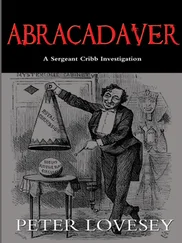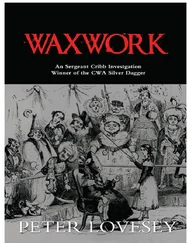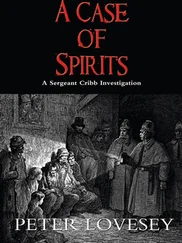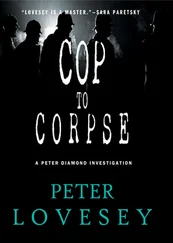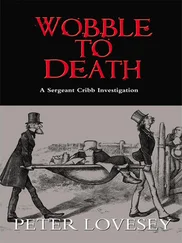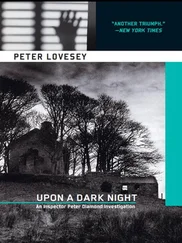Peter Lovesey - Rough Cider
Здесь есть возможность читать онлайн «Peter Lovesey - Rough Cider» весь текст электронной книги совершенно бесплатно (целиком полную версию без сокращений). В некоторых случаях можно слушать аудио, скачать через торрент в формате fb2 и присутствует краткое содержание. Жанр: Криминальный детектив, на английском языке. Описание произведения, (предисловие) а так же отзывы посетителей доступны на портале библиотеки ЛибКат.
- Название:Rough Cider
- Автор:
- Жанр:
- Год:неизвестен
- ISBN:нет данных
- Рейтинг книги:4 / 5. Голосов: 1
-
Избранное:Добавить в избранное
- Отзывы:
-
Ваша оценка:
- 80
- 1
- 2
- 3
- 4
- 5
Rough Cider: краткое содержание, описание и аннотация
Предлагаем к чтению аннотацию, описание, краткое содержание или предисловие (зависит от того, что написал сам автор книги «Rough Cider»). Если вы не нашли необходимую информацию о книге — напишите в комментариях, мы постараемся отыскать её.
Rough Cider — читать онлайн бесплатно полную книгу (весь текст) целиком
Ниже представлен текст книги, разбитый по страницам. Система сохранения места последней прочитанной страницы, позволяет с удобством читать онлайн бесплатно книгу «Rough Cider», без необходимости каждый раз заново искать на чём Вы остановились. Поставьте закладку, и сможете в любой момент перейти на страницу, на которой закончили чтение.
Интервал:
Закладка:
The apple gathering started soon after first light on Saturday. Traditionally, women were hired as casuals and shared in the work, which was how I first met Barbara’s best friend, the publican’s daughter, Sally Shoesmith. Sally was a chunky, bright-eyed redhead with freckles and a wicked smile that may have been quite misleading. At nine I wasn’t able to judge.
It was also my introduction to Bernard, the Lockwoods’ son, who farmed Lower Gifford. I wasn’t sure whether filial duty had brought him there or the strong turnout of village girls. From my point of view he was pretty unapproachable. My point of view was mainly his hobnailed boots, for his job was to take a ladder to the “keeping apples,” like Tom Putts and Blenheim Oranges, that had to be harvested by hand, rather than shaken down by the polers. Below him, the girls jostled with their “pickers,” bucket-shaped baskets made from withies. I think it gave Bernard a sense of power deciding which of his pretty entourage he would favor, from which you’ll have gathered that I didn’t much like him. He was handsome in a craggy, sunburned way, like a man on a knitting pattern. I preferred to follow the polers.
After an hour or so my ears picked up a distant buzz along the lane adjoining the orchard. It grew into a drone and then, thrillingly, the roar of the jeep. The Yanks were coming! I flung down my basket, dashed to the gate, and opened it in time for them to drive right in among the trees. To a chorus of delighted cries everyone stopped work and surrounded the jeep. Everyone, that is to say, except Bernard, who was stranded up his ladder with an armful of choice Tom Putts.
Wisely, Duke and Harry played down the excitement and showed they’d come to work. They were, after all, over an hour late. They joined in the job of arranging the apples in pyramidal heaps to get the frost before they were pressed. They were wearing what they called their fatigues, which amused the girls, who seized on every bit of service slang and every Americanism. To us all in 1943. the GIs were exotic beings who talked like film stars.
Speaking of films, did you ever see Henry Fonda in The Grapes of Wrath or any of his early movies? I mention this because to my eye there was a marked resemblance between Duke Donovan and Fonda. It wasn’t just a facial thing. It was in the build of the man, his height, the head set on quite narrow shoulders, the impression he gave of being brave and vulnerable at the same time. His movements were unhurried and economical, yet there was a restlessness about him that showed most in his eyes. I think he was homesick. He laughed as much as anyone that day in the apple orchard, his teeth gleaming like Fonda’s, but his eyes didn’t join in the fun. His mind was torn.
In my childish illusions of romance, Duke and Barbara were ideally matched, and I expected them to be drawn to each other. It didn’t cross my mind that he was married, let alone a father, and I’m sure Barbara didn’t suspect it, either.
Things developed less smoothly than I hoped. When Mrs. Lockwood appeared in midmorning, carrying two steaming teapots, we all stopped for a break, and Duke sat at a distance from Barbara. Most of the men drank cool cider from the owls and firkins they’d filled at the start of the day, but the girls preferred tea. I noticed that one of the casuals hired for the picking fetched a mug for Barbara. He stretched out on the grass at her side, practically touching her. I learned that his name was Cliff and that he had no regular work. Sometimes he helped behind the bar in the local. I wouldn’t have classed him as good-looking. Tall, dark, and unhandsome. All right, say it: I was a jealous brat.
The other GI, Harry, soon made inroads with Barbara’s friend, Sally, giving her a Lucky Strike to smoke and finding bits of twig in her hair that took ages to remove. Harry was more the Cagney type, wisecracking and pugnacious. He told us he’d had three stripes and lost them for some misdemeanor. Harry worried me. I didn’t want anything to go wrong.
When we resumed, Duke took a turn up one of the trees, and I noted smugly that Barbara joined the girls working from his ladder. After a while she advised him to leave some griggling apples on the bough he was stripping. He leaned on the branch, looked down, and asked, “What’s a griggling apple, for the love of Mike?” Barbara explained the folklore that any small apples had to be left on the trees for the pixies. Some of the girls hooted with laughter, expecting the GIs to join in, but Duke listened solemnly. Dialect words and country customs fascinated him. So Farmer Lockwood, who had a dry turn of humor, called out as he passed, “Come on, you lasses! Have Lawrence got into ‘ee?” and Duke had to be told that Lazy Lawrence, the guardian spirit of orchards, transfixed anyone who tried to cheat the fairy folk.
Disturbing things happened in the orchard that September afternoon. If, like me, you don’t believe in malign forces, you may think the cider at lunch had something to do with it. Or perhaps it was just the heady excitement produced by country girls mixing with American soldiers.
We’d gathered round an ancient wagon heaped with fallen apples of many colors, used to make the “windfall cheese” that would produce the first cider. The men sat on the shafts, the girls on upturned baskets, eating the bread and cheese with slices of onion that they’d brought in rush baskets and red handkerchiefs. Shafts of sunlight probed through the leaves overhead.
After we’d eaten, the girls showed the GIs how to tell your true love with an apple skin, peeling it in one piece and throwing it over your head to see if it fell in the shape of a letter. Harry’s fell conveniently into an 5, and Sally kissed him amid shrieks of excitement, but Duke refused to try the experiment. They persuaded him instead to throw an apple high in the air, without telling him the purpose of the game. Several girls rushed to catch it, leaping like rugby players, but no one caught it cleanly. It bounced loose, across the grass, straight to Barbara, who hadn’t joined in. She picked it up.
Someone handed her a knife. With everyone crowding round, she cut it cleanly in half and showed us two pips. The girls chorused, “Tinker, tailor,” and I realized that this was a version of the fortune-telling game my mother had once taught me to play with plum stones. A boy was supposed to discover what job he would have in adult life; a girl would find out what her true love would be.
She took one of the halves and bisected it. There were no pips showing. She cut the opposite half. Someone (I think it was Sally) shouted triumphantly, “Soldier!”-but the word froze on her lips because the knife had cut clean through the pip. Apparently it was a bad omen. Barbara threw aside the pieces of apple and said, “Silly nonsense, anyway.”
After lunch I didn’t see much of Barbara. She was collecting farther up the orchard, with her brother Bernard, I believe. I heard one of the girls say, “It don’t seem worth crying over,” and the other gave a shrug and moved on.
Towards four, Mrs. Lockwood brought out tea and cakes and we assembled along the dry-stone wall where the sun was warmest. Sally was sitting in the jeep with Harry. Duke leaned against a tree, whittling at a piece of dead wood he’d found. I couldn’t see Barbara, but each time a break was called, some of the girls would leave us to use the farmhouse toilet.
She still wasn’t back when Mr. Lockwood gave the word to start again. I noticed Mrs. Lockwood look anxiously about her before she picked up the tray and returned to the house. A short while later she was back to speak to her husband. He handed his ash pole to Harry to take a turn and marched off into the thick of the orchard.
I sensed trouble for Barbara. Soon a figure appeared from the direction Mr. Lockwood had taken. It was the man Cliff, whose interest in Barbara I’d noticed earlier. He marched briskly towards us, ignoring some mild taunts about skiving. Without a word to anyone he continued straight to the wall where the bikes were lined up, collected his, and cycled away up the lane.
Читать дальшеИнтервал:
Закладка:
Похожие книги на «Rough Cider»
Представляем Вашему вниманию похожие книги на «Rough Cider» списком для выбора. Мы отобрали схожую по названию и смыслу литературу в надежде предоставить читателям больше вариантов отыскать новые, интересные, ещё непрочитанные произведения.
Обсуждение, отзывы о книге «Rough Cider» и просто собственные мнения читателей. Оставьте ваши комментарии, напишите, что Вы думаете о произведении, его смысле или главных героях. Укажите что конкретно понравилось, а что нет, и почему Вы так считаете.

